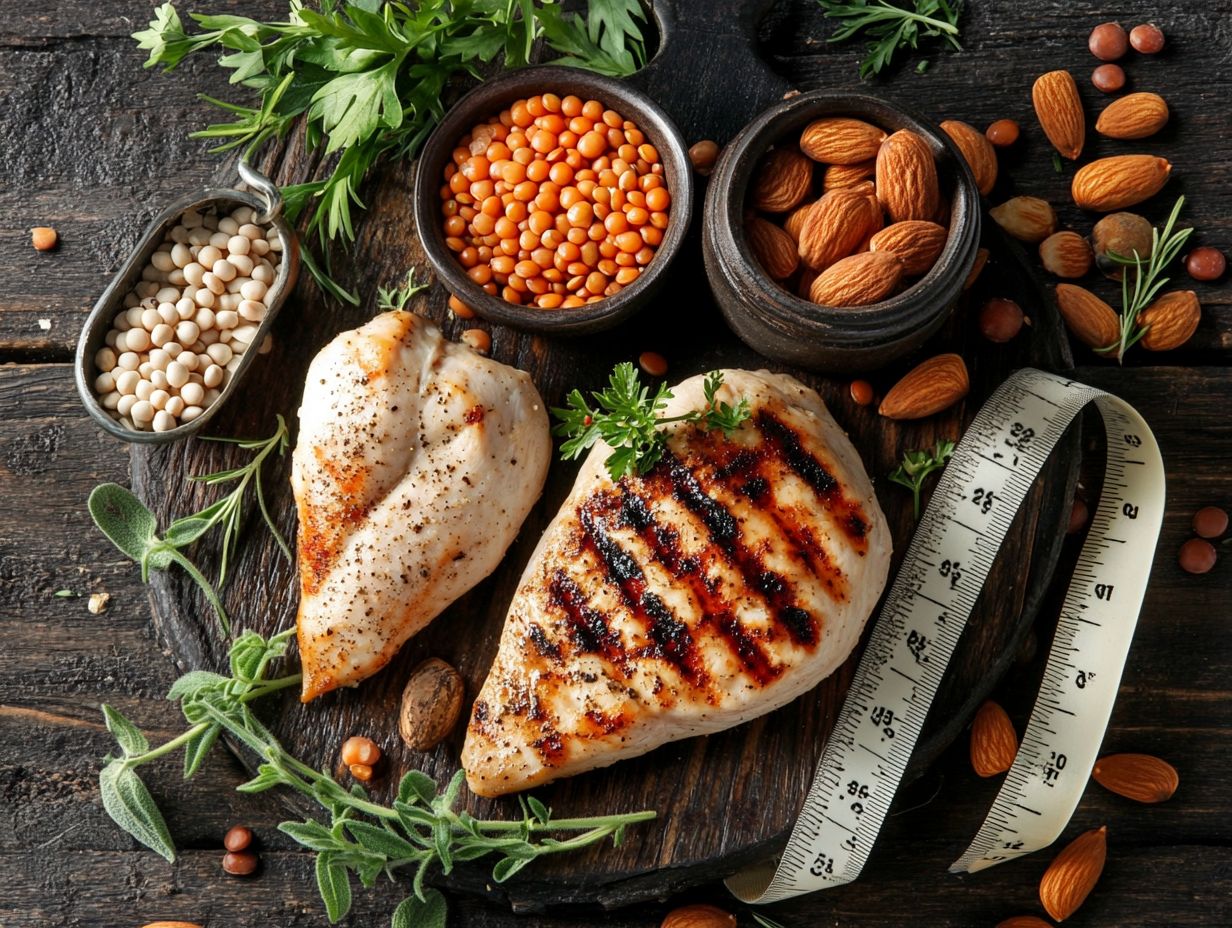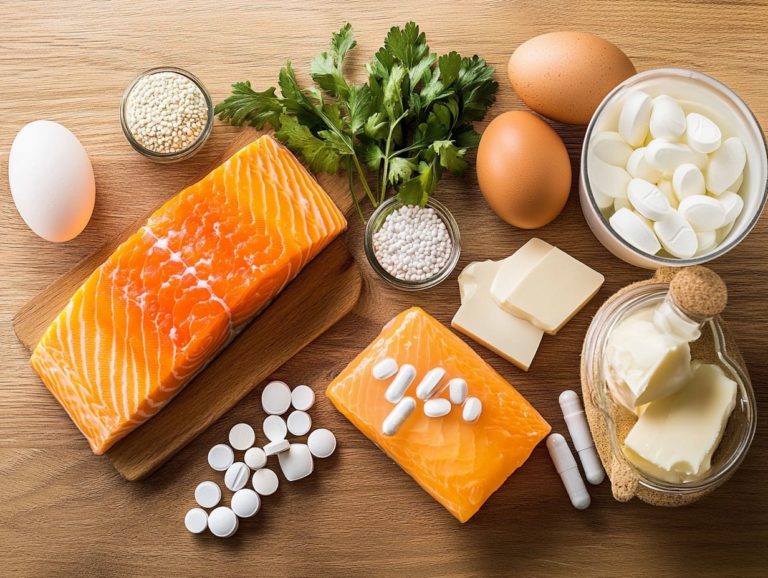How Much Protein Do You Really Need?
Protein is crucial for your health. It builds your body s tissues, enzymes, and hormones.
But how much do you actually need? This article explores key factors like your age, gender, and lifestyle that determine your personal protein requirements.
You ll learn how to calculate your protein needs and recognize the signs of deficiency. Understanding the potential risks associated with excessive consumption is essential.
We ll guide you on how to meet your protein goals, regardless of your dietary preferences.
Join us in exploring the vital world of protein and empower yourself to make informed nutritional choices.
Contents
Key Takeaways:
- Protein is vital for building and repairing muscles.
- Age, gender, activity level, and health goals affect protein needs.
- Consuming too much protein can pose health risks.
- You can meet your protein needs on various diets with careful planning.
Understanding Protein Needs
Understanding your protein needs is vital for staying healthy, especially as you age. Proper intake helps maintain muscle and enhances overall wellness.
Dietary protein supports muscle growth and supplies vital amino acids necessary for various bodily functions.
When navigating your protein requirements, consider personalized recommendations based on your lifestyle and activity levels. This approach will help you select healthy protein sources that fit within a balanced diet.
What is Protein and Why is it Important?
Protein is a macronutrient made of amino acids that plays a crucial role in your body’s structure and function. It s essential for building and repairing tissues, producing enzymes and hormones, and supporting overall health.
Protein is integral to maintaining a robust immune system and transporting essential nutrients throughout your body. Its structure allows it to serve diverse roles, from facilitating muscle contraction to enabling cell signaling.
Understanding the difference between complete and incomplete proteins is essential. Complete proteins like those in animal products contain all nine essential amino acids your body cannot synthesize. Many plant-based proteins may lack one or more of these vital amino acids.
Incorporating a variety of protein sources into your diet is crucial for achieving optimal health and well-being.
Factors that Affect Protein Requirements
Several factors determine your individual protein needs, including age, gender, activity level, and specific health goals.
As you age, your protein requirements might increase to maintain muscle mass and reduce the risk of conditions like sarcopenia. Your gender also affects protein recommendations, emphasizing the need for a personalized nutrition approach.
Age, Gender, Activity Level, and Health Goals
Age, gender, and activity level are pivotal factors in determining your protein needs. Your requirements can vary significantly based on your lifestyle and physical demands.
For instance, as you age, you may notice a decline in muscle mass, which increases the need for protein to maintain muscle health and strength. Older adults often benefit from around 1.2 grams of protein per kilogram of body weight, while athletes might require more to support rigorous training and recovery.
Gender also influences protein requirements. Generally, men need more protein due to greater muscle mass, but women, especially those who are pregnant or breastfeeding, should prioritize sufficient intake for their health and that of their children.
By assessing these factors, you can adjust your protein consumption to align with your personal health goals and ensure you’re getting the nutrients necessary for an active lifestyle.
Calculating Your Personal Protein Needs

To accurately calculate your personal protein needs, it’s essential to understand the recommended daily allowance (RDA) and tailor it to your unique circumstances. These include your activity level, body weight, and health objectives.
Generally, the RDA for protein falls between 0.8 grams and 1.2 grams per kilogram of body weight. This recommendation is influenced by various lifestyle factors.
This nuanced approach ensures that your dietary choices align with your individual goals and promote optimal health.
Recommended Daily Intake and How to Adjust
The recommended daily intake of protein varies depending on factors like age, gender, and physical activity. Aim for a daily intake that meets your specific protein needs.
If you engage in regular workouts or strenuous activities, reassess your intake and possibly increase it to support muscle recovery and growth.
As you age, your body may require a different eating plan, often necessitating adjustments in both protein sources and amounts to maintain muscle mass and overall health.
Being aware of your unique circumstances is key in determining how much protein you actually need. Lifestyle transitions or changes in your exercise routine can affect your needs.
Consulting with a nutritionist can provide personalized guidance. This ensures your protein consumption aligns perfectly with your evolving needs and goals.
Signs of Protein Deficiency
Recognizing the signs of protein deficiency is crucial for maintaining your overall health. Inadequate protein intake can manifest in various ways, including muscle wasting, fatigue, and a compromised immune system.
Be mindful of these symptoms. Taking proactive steps ensures your body receives the nourishment it needs.
Identifying Symptoms and Addressing Deficiency
Identifying the signs of protein deficiency requires keen observation of physical indicators. Look for muscle loss, hair thinning, and frequent infections. These symptoms suggest that your body isn’t getting the protein it needs.
Don’t ignore these signs! They could lead to serious health issues, like weakened immunity, poor wound healing, and even hormonal imbalances.
To combat this deficiency, incorporate a diverse array of high-quality protein sources into your diet. Consider including:
- Lean meats: Great for building muscle.
- Fish: Rich in omega-3 fatty acids.
- Legumes: Excellent plant-based protein source.
- Dairy products: Good for calcium and protein.
- Plant-based proteins like quinoa and tofu: Versatile options for vegetarian diets.
Boosting your protein intake can be as simple as adding protein-rich snacks to your meals or choosing fortified foods. In some situations, protein powders might also prove beneficial, especially for those with dietary restrictions or increased protein needs, such as athletes or older adults.
Regularly monitor your overall protein intake and adjust portion sizes to enhance your health and well-being.
Potential Risks of Excess Protein Intake
While protein is essential for your health, excessive intake can pose several risks. These include kidney damage, dehydration, and nutrient imbalances.
This highlights the importance of achieving a balanced approach to protein in your diet.
Health Concerns and How to Avoid Them

Excessive protein intake can lead to health concerns such as kidney strain, dehydration, and nutrient deficiencies. It’s crucial to monitor your protein consumption and ensure you’re properly hydrated.
To mitigate these risks, maintain a balanced diet rich in a variety of nutrients. Incorporate a mix of carbohydrates, healthy fats, and fiber-rich foods. This not only promotes overall well-being but also supports muscle growth and repair.
Pay close attention to your hydration levels. Adequate water intake is even more critical when you’re on a high-protein diet. Prioritize lean protein sources like fish, poultry, legumes, and low-fat dairy to enhance your nutritional value without the burden of excess saturated fats.
By being mindful of these factors, you can reap the rewards of protein while safeguarding your health.
Take action now! Assess your protein intake and consult a nutritionist if needed to optimize your diet.
Meeting Protein Needs on Different Diets
Meeting your protein needs can differ greatly depending on the diet you choose whether it’s vegetarian, vegan, or high-protein. This diversity requires you to be selective about your protein sources to ensure you re getting enough for your health and wellness.
Protein Sources and Alternatives for Various Diets
Various diets offer a wealth of protein sources for you to explore, from animal-based options like dairy and meat to plant-based alternatives such as legumes and nuts. This variety lets you tailor your protein intake to align with your personal dietary preferences.
It s especially vital to prioritize high-quality protein sources, especially if you’re in your golden years. These sources are essential for muscle maintenance and overall health. Incorporating lean meats like chicken and fish, along with eggs, can work wonders for your wellness.
If you lean towards a plant-based diet, consider options like quinoa, lentils, and chickpeas. They not only pack a protein punch but also deliver essential nutrients. Snacking on almonds or adding tofu to your meals can further boost your daily intake.
Thoughtfully weaving these protein sources into your breakfast, lunch, and dinner can effectively support your body’s needs and cultivate a balanced diet that promotes long-term wellness.
Frequently Asked Questions
What is the recommended amount of protein intake per day?
The recommended amount of protein intake varies based on individual factors such as age, weight, and activity level. Generally, aim for 0.8 grams of protein per kilogram of body weight, or 0.36 grams per pound. For example, a person weighing 150 pounds should consume around 54 grams of protein per day.
Can you consume too much protein?

Yes, it is possible to consume too much protein. Excessive protein intake can lead to dehydration, kidney problems, and weight gain. Keeping your diet balanced is key to feeling your best!
What are the best sources of protein?
Some of the best sources of protein include lean meats, poultry, fish, eggs, dairy products, and plant-based sources such as beans, lentils, and tofu. These options are not only high in protein but also provide essential nutrients and can be easily incorporated into meals.
How does protein help the body?
Protein is essential for building and repairing tissues, making hormones and enzymes, and maintaining strong bones and muscles. It also plays a crucial role in the immune system and can help with weight management by keeping you feeling full for longer.
Do different types of people require different amounts of protein?
Yes, different people require different amounts of protein. Factors such as age, gender, and activity level can affect the recommended protein intake. For example, athletes and individuals with certain medical conditions may need higher protein amounts to support their energy needs and muscle growth.
Can you meet your protein needs through a vegetarian or vegan diet?
Yes, it is possible to meet your protein needs through a vegetarian or vegan diet. Plant-based sources such as beans, lentils, nuts, and soy products are excellent sources of protein. Be sure to consume a variety of these foods to get all the proteins your body needs to function well.






